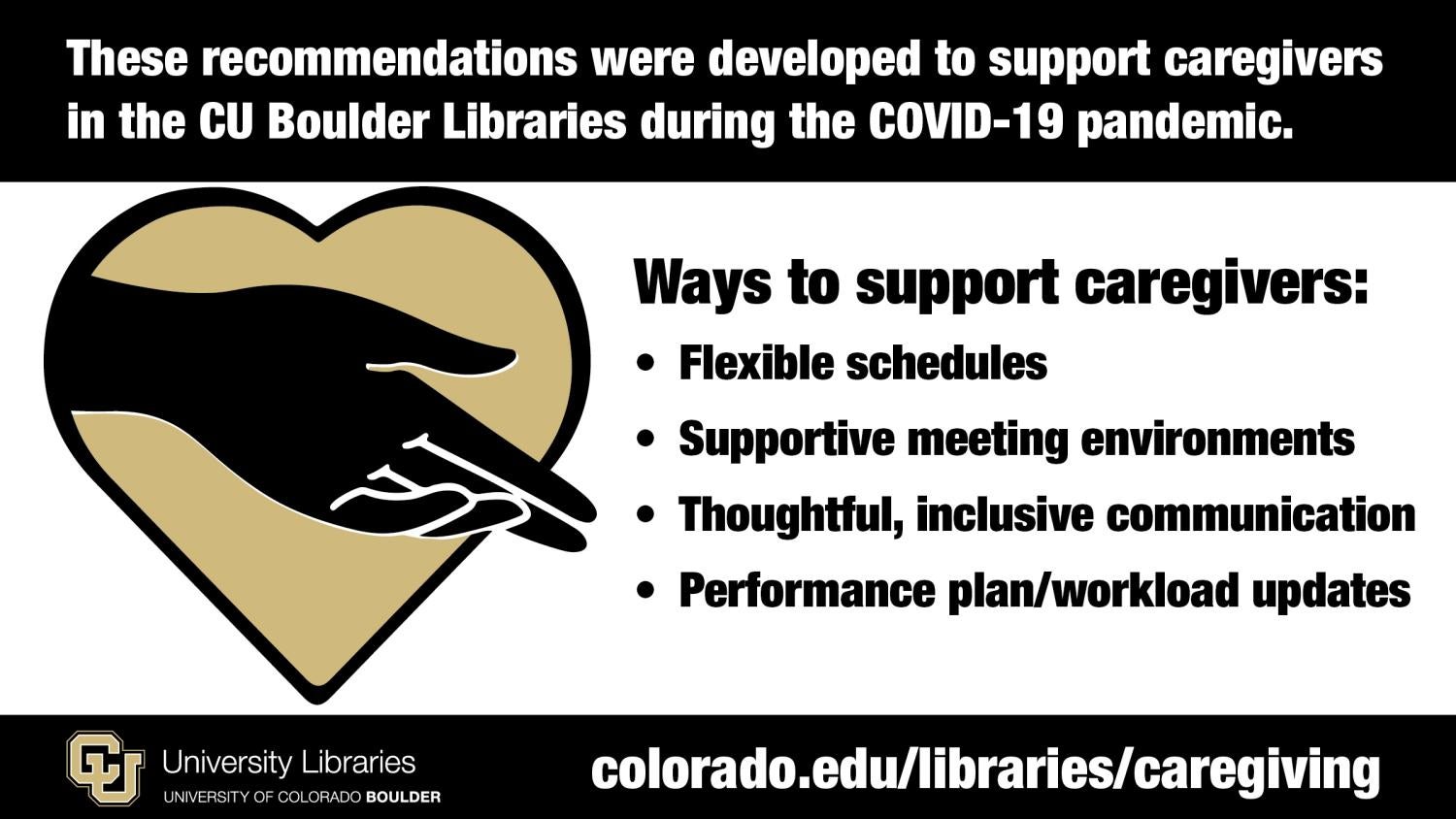Recommended Actions and Policies for the Benefit of Caregiving Staff and Faculty
The COVID-19 pandemic has severely impacted the ability of many Libraries employees to balance work and life. This has had especially negative consequences for caregivers, who may not have access to consistent or full-time child or eldercare.
Some of the issues caregivers experience during a typical workday include:
- Technology problems for school aged children/schoolwork assistance during school day
- Planned needs - lunches, exercise breaks, etc. for those in their care
- Meeting interruptions
- Unexpected sudden needs of those in their care (health, safety, etc.)
- Caring for an individual with constant need for supervision
- Coordinating care/meetings/schedules with others in the household
- Left out of discussions and decision making via email or Teams
Following a community discussion led by Libraries’ Human Resources, a small group was charged with creating recommendations, based on community feedback, for the implementation of guidance to support caregivers in response to the COVID-19 pandemic and its disproportionate impact on people with caregiving responsibilities. While these recommendations are focused on caregivers, they are also relevant as best practices in supporting improved work/life balance for all library employees.
Recommendations and Caregiver Support Toolkit
Last updated September 2020
Flexible Schedules
- Encourage work life balance. Employees are not expected to sit in front of their computer screen without breaks. Take into consideration self-care and breaks throughout the day. Allow employees to work around caregiving activities. Support supervisees and colleagues to attend training and professional development related to working during COVID.
- Supervisors should set manageable goals (including tasks related to reorganization) that are aligned with our strategic plan. Help employees prioritize work that is supporting or providing an essential service to the university community. Allow employees to determine the best way to complete assigned tasks.
- Explore flexible work arrangements and locations (on site vs. remote). Some employees may work outside of typical university work times (8-5) or in different time zones.
- Check in with colleagues, reports, and supervisors about what is working and what is not.
- Flexibility in scheduling is especially important for those employees who typically do not have the ability to be flexible in their work schedule, often university and classified staff.
Meetings
- Record organization-wide, presentation-oriented open meetings (e.g., such as Town Halls, etc.) that are so those who cannot attend can view later.Use transcription mode in Zoom so the content can be read instead of watched.
- Each meeting host should develop mechanisms for employees unable to attend meetings to provide feedback or questions asynchronously and anonymously when appropriate.
- Ask the question: “Should this be a meeting?”
- Respect people’s calendars and time they have blocked off. Empower people to say no to meeting invites; allow employees to suggest new times and or asynchronous meetings.
- Be considerate when employees can’t be on video or aren’t able to participate in real time, but do want to listen and contribute to meetings.
- Mute participants upon entry for large meetings.
Communication
- Encourage asynchronous communication when it makes sense.
- So caregivers are not left out of important conversations and decision making, a general recommendation for response time for email is two business days and one business day for Teams.
- Please communicate if there is a deadline for response.
- Sections should determine standards for email/teams response times and develop a system for indicating whether a message is high, medium, or low priority.
Performance Evaluations
- Supervisors are encouraged to update performance plans for staff and/differentiated workloads for faculty to reflect work being done during COVID.
- Weights within staff performance plans can be adjusted in coordination between supervisor and employee. Plans should reflect expectation changes due to the pandemic and shifting unit priorities including remote work and in person work. It should be understood that these plans can be adjusted going forward as needed and employees are encouraged to contact Libraries’ Human Resources to discuss.
Caregiver Support Toolkit
The resources below were developed to be integrated into the meetings, emails, documentation, and daily work life of individuals in the Libraries.
Email signature
Add this text, linked to internal documentation on these recommendations, to your email signature:
I stand with caregivers during COVID-19
Meeting invite blurb
Include this wording in your meeting invites:
[link to internal documentation on these recommendations]This meeting supports caregivers.[/link]
You can participate with or without turning on your camera and/or microphone. If you would like to participate asynchronously {contact me via email or Teams, fill out the Google Form [link], contribute to the Google Document [link]}.
Agenda one-liner
Include this text in all meeting agendas:
[link to internal documentation on these recommendations]This meeting supports caregivers.[/link] Please contribute to or comment on this agenda if you are unable to attend the meeting synchronously.
Out of office message
Caregivers are encouraged to set out-of-office replies while attending to caregiving duties. Suggested text:
I am out of the office due to caregiving duties. I will respond to your message as soon as possible upon my return. I appreciate your flexibility in accordance with the [link to internal documentation on these recommendations]Recommended Actions and Policies for the Benefit of Caregiving Staff and Faculty[/link].
Caregiver Zoom/Teams background
Download Zoom / Teams background (jpg)


